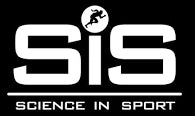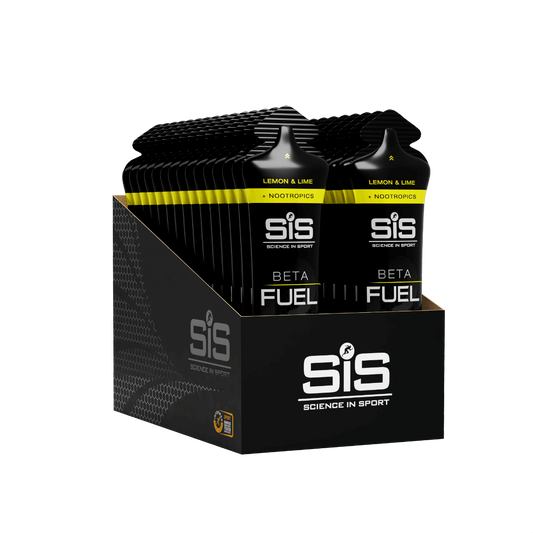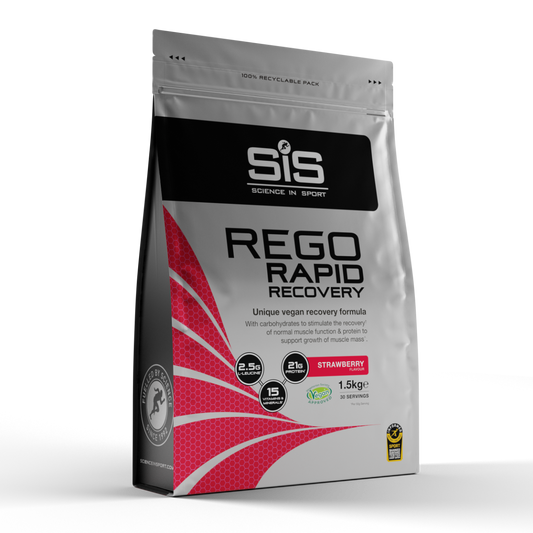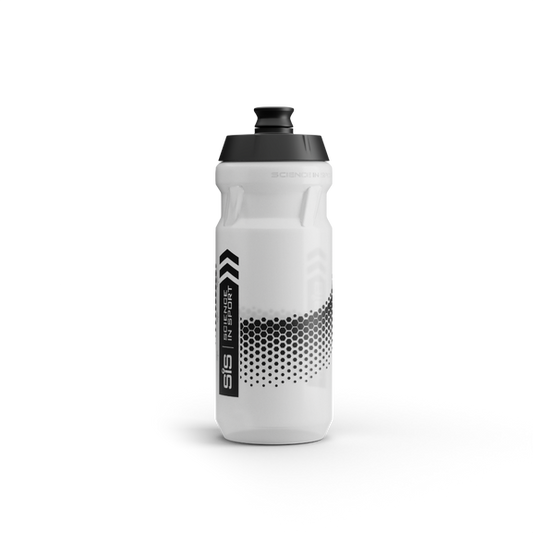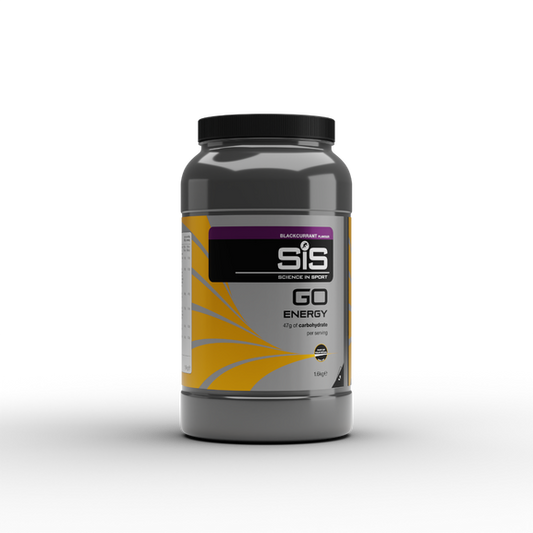The Science in Sport Beta Fuel range provides a variety of performance solutions to choose from to build your ultimate nutrition strategy. You might already have used our SiS Beta Fuel Powder, so other than having new SiS Beta Fuel options in Gels and Chews, what is different about it?
Our new SiS Beta Fuel formula is leading a revolution in endurance fuelling by using an optimised ratio of maltodextrin to fructose, providing a science-based complete fuelling solution for runners.
The combination of maltodextrin and fructose used in SiS Beta Fuel at a ratio of 1:0.8 provides a formula to enhance carbohydrate delivery and utilisation during exercise, whilst minimising gastrointestinal issues.
This new ratio of maltodextrin to fructose at 1:0.8 (previous 2:1) has been proven to:
- Enhance total exogenous carbohydrate oxidation by 17%
- Enhance mean power output during 10 maximal sprint efforts by 3%
- Increase the percentage of ingested carbohydrate oxidised from 62% (2:1 ratio) to 74% (1:0.8 ratio)
- Reduce symptoms of stomach fullness and nausea when compared to the 2:1 ratio
In the first study of its kind, we tested feeding athletes 120g of Science in Sport Beta Fuel per hour, singularly, and combined across our patented range of gels, chews and drinks. The previously recommended intake for endurance fuelling was 90g per hour.
- Even after 3 hours of sustained effort 50% of energy used was from the SiS Beta Fuel, rather than the body’s own fuel stores, with no cross-over from carbohydrate to fat usage taking place
- The 120g carbohydrate intake can be achieved from our drink, gel or jelly chew, or any combination of the three
- Athletes were using 1.5gm of carbohydrate per minute, the highest rates of carbohydrate oxidation ever reported, and had no stomach upset
- They were able to sustain high performance intensity, with lower perceived effort
For training and competition of 2 – 2.5 hours or more, SiS Beta Fuel is the next generation of endurance fuelling. These results have never been seen before and change everything we thought we knew about endurance fuelling guidelines.
In summary, the Science in Sport Beta Fuel range works by providing these two different forms of carbohydrate in a formula which can be simultaneously absorbed. This is key as the transportation of nutrients across the intestinal wall, which is a rate-limiting factor in carbohydrate oxidation during exercise.

NUTRITION AND RUNNING
The right combination of nutrition for running is a common challenge for most. As a runner, we have all been there, when your stomach starts churning you cannot focus on enjoying your run whether this is during training or a race.
Not only will you not be enjoying yourself, but you also won’t be performing your best. Gastrointestinal issues during running vary between individuals but most have experienced some form of stomach issue.
Although nutrition can be a challenge for a lot of runners, it’s key for performance. It is suggested that during endurance exercise (more than 2.5 hours) 80-120 grams of carbohydrate per hour should be consumed.
Carbohydrate ingestion in the form of a carbohydrate-electrolyte solution in the first hour of running exercise, in comparison to just consuming water alone can delay time to fatigue by 15 minutes.
But why do carbohydrates make such a difference? Understanding why you need to consume carbohydrates during exercise should underpin your decision on whether you feel you ‘should’ or ‘should not’ eat whilst you’re running.
By consuming carbohydrates during running, we’re able to maintain our blood glucose levels which will in turn delay fatigue and spare our energy stores (such as carbohydrate stored in the muscle) and allow us to keep exercising for longer.
Dehydration during running can also result in stomach issues being reported, as such when comparing runners in a dehydrated or hydrated state, 37.5% of runners in the dehydrated state reported gastrointestinal complaints.
So as runners, we need to be consuming both adequate carbohydrate whilst also staying hydrated to perform at our best and hopefully avoid gastrointestinal issues.
A lot of this will come down to individuality and finding what works for you to perform at your best consistently.
HOW TO USE SIS BETA FUEL AS A RUNNER
The longer we run for, the more we need to focus on fuelling strategies. Under fuelling and dehydration will ultimately lead to ‘hitting a wall’, where putting one foot in front of the other suddenly becomes a tremendous task.
The key to SiS Beta Fuel is the combination of two different forms of carbohydrates, maltodextrin and fructose. Using a combination of different carbohydrates during running in comparison to a single form of carbohydrates has been shown to improve running performance.
Importantly, as mentioned above the 1:0.8 ratio has been shown to reduce symptoms of stomach fullness and nausea when compared to the 2:1 ratio which is great when considering the gastrointestinal issues often reported during running.
A great way of being able to access nutrition during running is using hydration vests. You can use these vests to carry water mixed with a SiS Beta Fuel Powder, in a flavour of your choice (Red Berry, Strawberry & Lime or Orange). The SiS Beta Fuel Powder also contains sodium which is key for staying hydrated.
The SiS Beta Fuel Gels and Chews can also be used for running, preference will come down to the individual with some people relying on gels, whilst others prefer more ‘food’ like textures, such as the chews.
For those who like to consume gels whilst running, the SiS Beta Fuel Gel with Nootropics could be a game changer during that last push. Ideal for when you are in the last quarter of your marathon, you know the end is near, it is all going to be worth it, but your physically and mentally exhausted and in need of a boost to help give you that push to the finish.
Nootropics are substances that can enhance cognitive performance giving you that mental lift you might need. So, as well as 40 grams carbohydrate, the SiS Beta Fuel Gel with Nootropics contains 1 gram of the amino acid L-taurine, 250 milligrams of Cognizin® to enhance information processing and 200 milligrams of caffeine with 200 milligrams of L-theanine, the amino acid which has been shown to increase subjective feelings of alertness, while reducing feelings of ‘jitters’ that you get with caffeine alone.
Remember, as a runner, you are still an individual. Both in preferences of fuel (i.e., liquid, or solid) and how much carbohydrate your body needs depending on body weight.
You can train your gut to manage greater amounts of carbohydrates but this should be done gradually finding an optimal nutrition strategy that works for you, so come race day you can perform your best.

Haskell, C. F., Kennedy, D. O., Milne, A. L., Wesnes, K. A., & Scholey, A. B. (2008). The effects of L-theanine, caffeine and their combination on cognition and mood. Biological psychology, 77(2), 113-122.
Jeukendrup A.E. Carbohydrate feeding during exercise. Eur. J. Sport Sci. 2008; 8:77–86. doi: 10.1080/17461390801918971.
Jeukendrup, A.E. (2010). Carbohydrate and exercise performance: the role of multiple transportable carbohydrates. Current Opinion in Clinical Nutrition & Metabolic Care. Jul;13(4):452-7.
O’Brien, W. J., Stannard, S. R., Clarke, J. A., & Rowlands, D. S. (2013). Fructose–maltodextrin ratio governs exogenous and other CHO oxidation and performance. Medicine & Science in Sports & Exercise, 45(9), 1814-1824.
O’Brien, W. J., & Rowlands, D. S. (2011). Fructose-maltodextrin ratio in a carbohydrate-electrolyte solution differentially affects exogenous carbohydrate oxidation rate, gut comfort, and performance. American Journal of Physiology-Gastrointestinal and Liver Physiology, 300(1), G181-G189.
Rehrer, N. J., Beckers, E. J., Brouns, F., Ten Hoor, F., & Saris, W. H. (1990). Effects of dehydration on gastric emptying and gastrointestinal distress while running. Medicine and Science in Sports and Exercise, 22(6), 790-795.
Tsintzas, O. K., Williams, C., Wilson, W. & Burrin, J. (1996). Influence of carbohydrate supplementation early in exercise on endurance running capacity. Medicine and science in sports and exercise, 28(11), 1373-1379.
Wallis, G.A., Rowlands, D.S., Shaw, C., Jentjens, R.L., Jeukendrup, A.E. (2005). Oxidation of combined ingestion of maltodextrins and fructose during exercise. Medicine & Science in Sports & Exercise. Mar;37(3):426-32.
Wilson, P. B., & Ingraham, S. J. (2015). Glucose‐fructose likely improves gastrointestinal comfort and endurance running performance relative to glucose‐only. Scandinavian journal of medicine & science in sports, 25(6), e613-e620.
